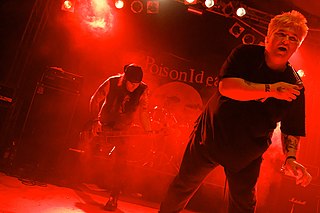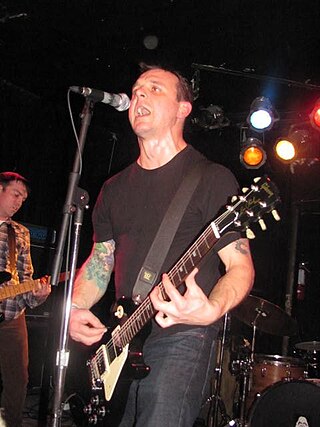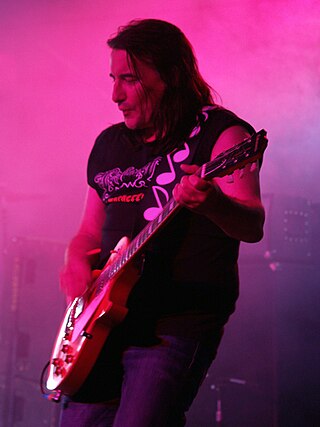Related Research Articles
The Crystal Set were an Australian indie rock group formed in March 1983. By 1987 the line-up was Russell Kilbey, Phillip Maher, Davey Ray Moor and Tim Seckhold (drums). In April 1988 Moor was replaced by Craig Hooper, who was replaced in turn by Luke Blackburn, in May 1989. The group issued two studio albums, From Now On and Almost Pure, before disbanding later that year. Russell Kilbey is the younger brother of the Church's mainstay, Steve Kilbey.

Rose Tattoo are an Australian rock and roll band, now led by Angry Anderson, which formed in Sydney in 1976. Their sound is hard rock mixed with blues rock influences, with songs including "Bad Boy for Love", "Rock 'n' Roll Outlaw", "Nice Boys", "We Can't Be Beaten" and "Scarred for Life". Their first four albums were produced by Harry Vanda and George Young who also worked with AC/DC. They disbanded in 1987, subsequently reforming briefly in 1993 to support Guns N' Roses on an Australian tour. They reassembled again from 1998 and have since released two more studio albums.
X is an Australian punk rock band, formed in Sydney, New South Wales in 1977 founded by Ian Rilen, Steve Lucas, Ian Krahe and Steve Cafiero. The group was formed simultaneously to, and with no knowledge of, the Los Angeles group of the same name.

Poison Idea was an American punk rock band formed in Portland, Oregon, in 1980.

Antisect are a rock band based in London, England. Their roots are in hardcore/anarcho punk and metal.
The Wild Cherries were an Australian rock group, which started in late 1964 playing R&B/jazz and became "the most relentlessly experimental psychedelic band on the Melbourne discotheque / dance scene" according to commentator, Glenn A. Baker.

The Swinging Blue Jeans are a four-piece 1960s British Merseybeat band, best known for their hit singles with the HMV label: "Hippy Hippy Shake", "Good Golly Miss Molly", and "You're No Good", issued in 1964. Subsequent singles released that year and the next made no impression. In 1966, their version of Burt Bacharach and Hal David's "Don't Make Me Over" peaked at number 31 in the UK Singles Chart, but the group never charted again.

Dan Schafer, better known by his stage name Dan Vapid, is a punk rock musician from Chicago, Illinois, United States. He is best known for his participation in Screeching Weasel, The Riverdales, The Methadones, and various other punk rock/pop punk bands. His current band is Dan Vapid and the Cheats.

Lobby Loyde, also known as John Barrie Lyde or Barry Lyde, was an Australian rock music guitarist, songwriter and producer.
Machinations are an Australian synthpop band which formed in 1980. They reached the top 20 on the Kent Music Report albums chart with Big Music in 1985. Their top 30 hits on the related singles chart are "Pressure Sway", "No Say in It", "My Heart's On Fire" and "Do to You". By 1989 the group had disbanded. They briefly reunited in 1997 and then reformed in 2012.
"Treat Her Right" is a soul music song, with a standard 12-bar-blues structure. Written by Roy Head and Gene Kurtz, it was recorded by Head and The Traits and released on the Back Beat label in 1965.

Michael Thomas Cocks, known professionally as Mick Cocks, was an Australian musician, most noted for his guitar and songwriting work with Rose Tattoo. His original sound and style heavily influenced Guns N' Roses, who recorded a cover of the Rose Tattoo song "Nice Boys". He was also a member of Heaven, The Headhunters, Illustrated Men, Doomfoxx, Pete Wells' Heart Attack, and the Ted Mulry Gang. On 16 August 2006, Rose Tattoo were inducted into the Australian Recording Industry Association (ARIA) Hall of Fame.
Tim Gaze is an Australian rock and blues guitarist, songwriter, singer, and producer. He was a member of several Australian groups from the 1960s to 1990s including Tamam Shud, Kahvas Jute (1970), Ariel (1973–74) and Rose Tattoo (1985–87). He also had a solo music career and released the albums, Band on the Run, Rough Trade (1992), Blue Sierra (1996) and Blues Remedy (1998). In April 2008 he issued a retrospective compilation covering both his group and solo work, Reckless Love: the Tim Gaze Anthology.

The Pleasure of Your Company is the third studio album by Australian new wave rock band Models, which peaked at No. 12 on the Australian albums chart. It was released in October 1983 on Mushroom Records with Nick Launay producing. The album provided three singles, "I Hear Motion" released in September, which peaked at No. 16. Neither "No Shoulders, No Head" released in December, nor "God Bless America" released in April 1984, peaked into the Australian Top 50 singles chart. The video for "God Bless America", from March 1984, featured backing singers Kate Ceberano and Zan Abeyratne.
Richard Arnold Pleasance is an Australian rock musician and producer. He was a founding member of Boom Crash Opera on guitar, bass guitar, vocals and as a songwriter in 1985; they released three albums before Pleasance left in 1992. Their hit Australian Recording Industry Association (ARIA) singles, "Great Wall" and "Onion Skin" were co-written by Pleasance, who also co-produced their second album, These Here Are Crazy Times. His debut solo release, Galleon received four nominations at the ARIA Music Awards for 1992. Pleasance composed the theme music for Australian television series, SeaChange (1998–2001), for 2006 feature film Kenny and more recently he composed the theme music for the prison drama series Wentworth. Pleasance is married to Michelle and, as from May 2009, he was living in Hepburn Springs, Victoria where he has a recording studio.
Buster Brown was an Australian rock band, which featured vocalist Angry Anderson and drummer Phil Rudd, that was formed in Melbourne in 1973. Their sound was hard rock mixed with blues rock influences. Their first album, Something to Say was produced by Lobby Loyde and released in 1974. Rudd left to join an early version of AC/DC while Anderson continued with new line-ups and eventually disbanded the group in November 1975. Anderson joined Rose Tattoo which later included former Buster Brown bandmates, Geordie Leach on bass guitar and Dallas "Digger" Royall on drums.
The Zimmermen were an Australian rock and country music group, which formed in June 1983. Members included John Dowler on vocals, Mick Holmes on guitar and vocals, Graeme Perry on drums, and Peter Tulloch on guitar. They released two albums, Rivers of Corn, Way Too Casual, before disbanding in 1990. Former guitarist Steve Connolly died in 1995.
Olympic Sideburns were an Australian shockabilly band formed in late 1982. The line-up of Paul Bryant on bass guitar, Peter "Jex" Byron on lead vocals, Maurice Frawley on lead guitar and vocals, Ian Hill on keyboards and Maurice Molletta on drums issued their debut album, The Olympic Sideburns (1985). Calum McAlpine on drums had joined in late 1985 and the group released their second album, Dixie Truck Stop! (1987), before disbanding in 1988. Australian musicologist Ian McFarlane compared their two albums, the latter has "more authentic Rolling Stones/Creedence Clearwater Revival sound as opposed to the previous punk/psychedelic/shockabilly hybrid" of the former. Maurice Frawley died in 2009 and founding guitarist Spencer P. Jones died in 2018.
Fire were an Australian gothic, acid rock band, which formed in 1983 as Ku Klux Frankenstein. Founders were Lindsay Brunsdon on guitar and vocals, Andrew Flossos on drums, Kerrie Hickin on bass guitar and Neil D Schneider on vocals and saxophone. They issued an extended play, Love for Sale (1985) and changed their name in 1986. Fire's sole studio album, A Frame of Purple Roses, was released in early 1987 and the group disbanded at the end of that year.
References
- 1 2 3 4 5 6 7 8 9 10 McFarlane, Ian (1999). "Encyclopedia entry for 'Shindiggers'". Encyclopedia of Australian Rock and Pop . St Leonards, NSW: Allen & Unwin. ISBN 1-86508-072-1. Archived from the original on 19 April 2004.
- 1 2 3 4 "Extract of The Age from Melbourne, Victoria, Australia" . The Age . 21 June 1985. p. 41. Retrieved 15 May 2024– via newspapers.com.n.b. online version is an extract created by an optical character reader (OCR).
- ↑ Holmgren, Magnus. "Lobby Loyde". Australian Rock Database. Archived from the original on 11 March 2004. Retrieved 15 May 2024.
{{cite web}}: CS1 maint: unfit URL (link) - ↑ Spinali, Steve (December 1986). "Crash Your Party LP". Maximum Rock n Roll. No. 43. Retrieved 15 May 2024.
- ↑ "Shindiggers - Maximum Beat - Amazon.com Music". Amazon.com. Retrieved 15 May 2024.
- 1 2 3 4 de Looper, Michael (October 2019). "Independent Australian Labels 1955 to 1990" (PDF). punkjourney.com. Archived from the original (PDF) on 23 February 2024. Retrieved 15 May 2024– via National Library of Australia.